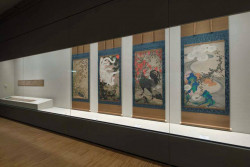
August 13, 2009
The Other Expatriates
Joseph Hincks learns the pleasures of exile from members of Tokyo's lesser-known foreign communities
By Metropolis

Photo by Benjamin Parks
Alexandra Ishii (51, Negros Oriental, The Philippines)
“Start spreading the news…”
Sinatra’s opening lines dribble out of the speaker before Alexis is ready—she’s late running onto the stage, and still adjusting her hat.
She restarts the tape, mumbling apologies to the patrons.
The second time goes off without a hitch. A few bars in, and the veteran hostess is high-kicking on the “Da da da-da-da’s” and draping her hands over the piano lid. Something special is happening inside Ginza’s Club Yuki—the few customers are craning forward on the bar’s black leather sofa, and the mama-san between them has stopped fanning herself even though she’s seen this act 100 times before.
By the time “These little town blues…” resounds through the room, there are glimmers of dignity and defiance beneath the tacky twinkling fairy-lights. The song’s climax elicits from today’s scant audience the same epiphany that a director in Manila must have had all those years ago.
A few hours earlier, at a lifeless coffee shop in Tama Plaza, western Tokyo, Alexis is fidgeting as her story jumps from her hometown in the Philippine province of Negros Oriental to the capital Manila and on to Tokyo.

Photo by Benjamin Parks
“There were many male action stars, but I had no rivals at that time,” she recalls. “I was the first lady who did stunts without doubles.”
Alexis was shooting lucrative commercials for the likes of Coca-Cola and San Miguel beer when she met a recruiter from Tokyo who offered her a spot singing in a Roppongi club. At first she was reluctant to go.
“I didn’t even consider myself a good singer,” she says. But the insistence of her sister, who had hopes of forming a musical trio to tour Japan—not to mention the discovery that her then boyfriend was seeing another woman, with whom he had a child—provided Alexis with the impetus to leave the Philippines.
“The Japanese were so nice, so friendly, so good,” she says. “Maybe that’s why I had such high regard when I first met my husband here. He was not a customer—he used to be a model. He introduced me to his mother and brother.”
The clientele at Club Yuki sometimes make disparaging remarks about Filipinas. They ask whether she sends a lot of money back home to her poor relatives, and whether she sleeps with customers.
Alexis bristles at such talk. “I actually came back [to Japan] to settle down,” she says. “I said no to great opportunities—Chuck Norris did a flick in the Philippines, and they asked me to appear, but at that time I wasn’t interested, I was thinking, ‘Anyway, I’m going to get married, so I don’t have to do it anymore.’”
When illness prevented her husband from working, Alexis turned to hostessing to support her two children, Susuke, 17, and Fujimaru, 15. “I am a Filipina, I am accepted to do this job even if I can’t speak Japanese well. If I were to work daytime, nobody would employ me. This job was not my dream… but I am grateful for it now. I am using my talents—singing, dancing.”
Alexis says that all the hardship she’s faced has bought her closer to God. And indeed, it is Christian rhetoric, not vitriol, that punctuates her speech. I write down the prayer that she says resonates with her most: “Lord, please keep my heart free from hate, my mind from worry. Help me to live simply, expect little and give much.”







